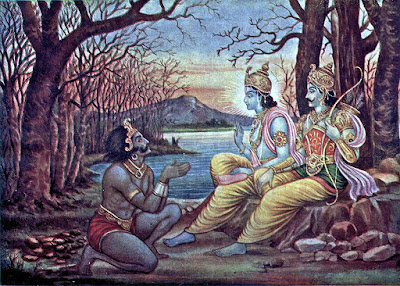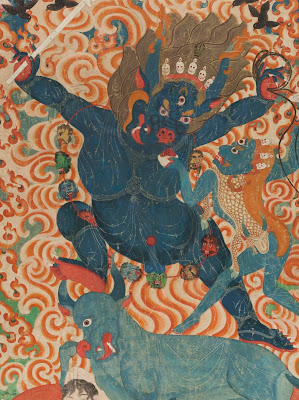Reading Notes: Mahabharata Part B
Dhritarashtra
-The blind king
-A strange man; extremely changeable in terms of temperament
and alliances
-Watches the
Pandavas lose everything as Yudhistira gambles with Sakuni, and then in one command grants it all back to them
-Refuses to intervene
regarding the 13 year exile of the Pandava brothers, but becomes extremely
anxious regarding their fate and fervently hopes they are not suffering
-Dismisses
Vidura from his position in the kingdom in a flurry of emotion; sends a messenger
to beg him to return the next day
-Loves both his sons and nephews, but is unable to bring
himself to reconcile the two
-Recognizes his son Duryodhana as evil, but cannot bring himself to displease
him
The Brave Draupadi
Even as the Pandava brothers stand by and watch fate deal them a cruel blow in the form of a game of dice, Draupadi is very vocal about her distress and attempts to rally the brothers against their cousins. They all appear to be passive onlookers as their wealth, prestige, and finally their own identities are gambled away by Yudhistira. Draupadi is the only one with the guts to speak up against this ridiculousness. Yudhistira also gambles away women without a second thought; while men handed over to the enemy may be made slaves or prisoners, women are put in the position of being subjected to unwanted sexual advances, essentially being made into sex slaves. Yudhistira needs to re-evaluate his feminist agenda.
Quote on Page 81
"It is not pleasant to stay in any one place too long."
-The wise sage Vyasa sums up the basic human yearning to move about the earth in these simple words
-In some ways, the exile may have proved to be an adventure: the five brothers got to travel far and wide with one another
Story Idea
-The shenanigans of the Pandavas
-Even as royalty, brothers are not immune from approaching one another in jest and getting involved in boyish mischief
-The untold tales of the 13 years in exile
~~~
Bibliography
Narayan, R.K. The Mahabharata: A Shortened Modern Prose Version of the Indian Epic.




Comments
Post a Comment